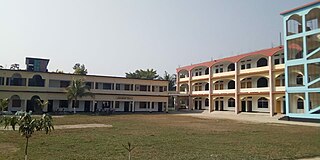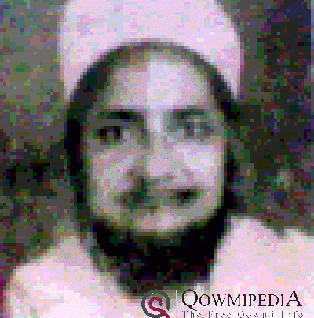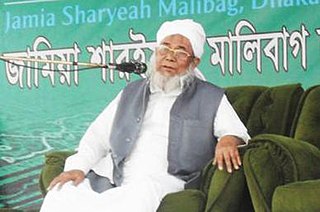
Education in Bangladesh is administered by the country's Ministry of Education. The Ministry of Primary and Mass Education implements policies for primary education and state-funded schools at a local level. Education in Bangladesh is compulsory for all citizens until the end of grade eight. Primary and secondary education is funded by the state and free of charge in public schools.

Al-Jāmiʿah Al-Islāmiyyah Patiya, better known simply as Patiya Madrasa and formerly known as Al-Madrasah Aḍ-Ḍamīriyyah Qāsim al-ʿUlūm, is a Qawmi Madrasah located in Patiya Upazila of Chittagong District, Bangladesh. It was established in 1938 by Azizul Haq under the direction of Zamiruddin Ahmad. It is also known as an International Islamic University. It has a role in the promotion of Islam in Bangladesh, inclusion of Qawmi Madrasas under one syllabus, providing modern and higher education for scholars.
Qawmi Madrasah is an adjective describing one of the two major madrasah educational categories in Bangladesh. The Qawmi madrasahs are not regulated by the Bangladesh Madrasah Education Board. As private charitable organizations, Qawmi madrasahs are supported almost exclusively by donation.

Wifaqul Madarisil Arabia Bangladesh is the largest Qawmi madrasa education board in Bangladesh. it was founded in April 1978 after a seminar of Islamic scholars. This organization of Qawmi Madrasas of Bangladesh is also known as the "Wifaqul Madaris". It is an extension of the process that formed the Wafaq ul Madaris Al-Arabia, Pakistan in 1957. "Bangladesh Qawmi Madrasah Education Board" is the largest federation of Islamic seminaries in Bangladesh. Qawmi educational system practices originate from the traditional Muslim educational system of Bangladesh. At present, there are more than 65,000 Qawmi Madrasahs in Bangladesh. As of 2013, more than 20,000 Seminaries across the People's Republic of Bangladesh are affiliated with "Befaqul Madaris". It controls all the seminaries which are run by Deobandi School of thought. Deobandi School of thought is supposed to be the most powerful and dominated school of thought in Bangladesh.
Abū al-Khayr Muḥammad Ayyūb ʿAlī al-Māturīdī, or simply Ayub Ali, was a Bangladeshi Islamic scholar, author and educationist. He was awarded the Ekushey Padak in 1976 by the Government of Bangladesh.

The West Bengal Board of Madrasah Education is the state government administered autonomous examining authority for affiliated and recognized madrasahs in West Bengal, India. Perhaps among the oldest post-secondary boards in India, it is the only madrasah board that is recognized by the Government of India. It is one of the parastatal organization of the Minority Affairs and Madrasah Education Department. The West Bengal Board of Madrasah Education is the West Bengal state government administered autonomous examining authority for the High Madrasah examination of West Bengal, India. It has come into force by the West Bengal Board of Madrasah Education Act-1994.
Al-Hayʼat al-ʿUlyā lil-Jāmiʿāt al-Qawmiyyah Bangladesh is the government-recognized combined Qawmi Madrasah Education Board of Bangladesh, having the authority to arrange central examinations and to issue certificates. It consists of six Qawmi Madrasah Education Boards: Befaqul Madarisil Arabia Bangladesh, Befaqul Madarisil Qawmia Gauhordanga Bangladesh, Anjumane Ittehadul Madaris Bangladesh, Azad Deeni Edaraye Talim Bangladesh, Tanjeemul Madarisid Diniya Bangladesh, and Jatiya Deeni Madrasa Shikkha Board Bangladesh.

Government Madrasah-e-Alia is a government madrasa located in Bakshibazar, Dhaka, Bangladesh. Since its founding, the madrasah has been playing a significant role in imparting and spreading Islamic education.
Muhammad Abdullah was a Bangladeshi Islamic scholar and academic. He was a professor of Dhaka University and researcher.

Dhipur Islamia Fazil Madrasah is a Bangladeshi school located in Tongibari, Munshiganj. It is affiliated with the Islamic University, Kushtia and Islamic Arabic University.

Satpur Kamil Madrasah is an educational institution situated in Lamakazi at Bishwanath upazila, Sylhet. The madrasah is run under "Alia madrasah" curriculum up to kamil level. In 2017, Honours course was started besides regular curriculum under the affiliation of “Islamic Arabic University“,Dhaka. Among the 4.38 acres of total registered land only 1.65 acres are used as main academic area of the madrasah with current number of students being over 1500. A reconstruction project of the age-old educational building starting in 2016, has recently come to an end.
Barakhain Jameya Jamhuria Fazil Madrasah is an Islamic institution situated at Barakhain in Anwara, Chittagong. It was established to train the students Islam-based education and culture in 1974.

Mushāhid Aḥmad Bāyampūrī was a late-twentieth century Bengali Islamic scholar, teacher, writer, orator and politician. Bayampuri served as a member of the National Assembly of Pakistan, the professor of Hadith studies at Sylhet Government Alia Madrasah, the principal of Darul Uloom Kanaighat and the president of the Eastern Sylhet Independent Religious Arabic Madrasah Education Board. His numerous works, which covered a range of disciplines in Islamic literature such as Sufism, Qur'anic exegesis and the political aspects of Islam, were written in the Arabic, Bengali and Urdu languages. Some of his books are part of syllabic studies under the Independent Religious Board of Education.
Badedeorail Fultali Kamil Madrasa is an Islamic educational institution located in Zakiganj, Sylhet District, Bangladesh. The madrasa was founded in 1920, and is now affiliated with the Islamic Arabic University for degree and honours programmes.
Pabna Islamia Madrasah, officially Pabna Islamia Fazil Madrasah, is an Islamic religious higher education institution and Alia Madrasah located in Pabna district of Bangladesh. However, the madrasa is better known as its parent institution Darul Aman Trust. In the 2011 entrance examination, the institution was ranked second in the country and ninth in 2014. Maulana Iqbal Hussain is currently the principal of the madrasa.

Qazi Mu'tasim Billah Bahar was a Bangladeshi Islamic scholar, teacher, author and politician. He was the principal of Jamia Shar'iyya Malibagh for over four decades, a former professor at the University of Dhaka and the founding principal of Jamia Islamia Darul Uloom Madania in Jatrabari, Dhaka. He has written many books and articles in the Bengali language and pioneered the introduction of a Bengali-medium among the Qawmi madrasas of Bangladesh.
Baitush Sharaf Adarsha Kamil Madrasah ) is a religious educational institution and alia madrasah in Bangladesh. The madrasah was founded in 1982 by Shah Sufi Abdul Jabbar. The madrasah is located in Dhanialapara area under Double Mooring Thana of Chittagong city. This madrasah secured the first rank in the departmental level in the Dakhil examination held under Madrasa Education Board in 2019.

Buzurg Santoshpur Karamatia Fazil Madrasah is a madrasa located in Mithapukur, Rangpur District, Bangladesh.

The Alia Madrasa or Alia Madrasa education system is a modern Islamic education system in the Indian subcontinent, combining Islamic and general education, and is considered the oldest education system in the subcontinent since the beginning of British rule in India. In 1780, Warren Hastings, the governor of Fort William in Bengal, introduced this educational system by establishing the Calcutta Alia Madrasa. Later, many madrasas were established in India, Pakistan, and Bangladesh based on the model of this Kolkata Alia Madrasa; these educational institutions are basically called Alia Madrasas.











